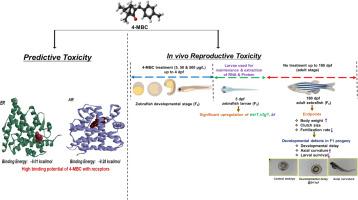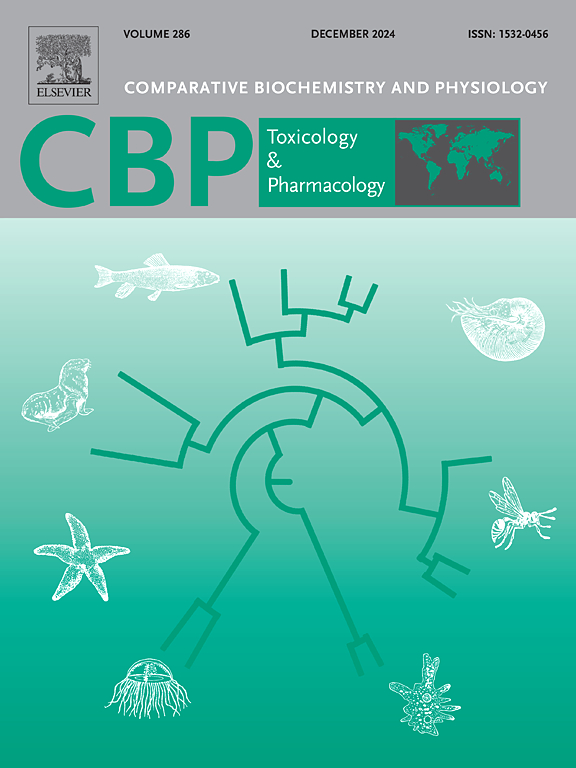Embryonal exposure to 4-methylbenzylidene camphor induces reproduction impairment in adult zebrafish (Danio rerio)
IF 3.9
3区 环境科学与生态学
Q2 BIOCHEMISTRY & MOLECULAR BIOLOGY
Comparative Biochemistry and Physiology C-toxicology & Pharmacology
Pub Date : 2024-10-15
DOI:10.1016/j.cbpc.2024.110051
引用次数: 0
Abstract
This study investigated how early exposure to xenobiotics can lead to disease in adulthood, which is challenging for toxicologists. We employed a ‘cradle to grave’ approach using zebrafish (Danio rerio) embryos exposed to 4-methylbenzylidene camphor (4-MBC), a commonly used organic UV filter. Molecular docking and simulation studies confirmed the predictive toxicity and stable interaction of 4-MBC with androgen and estrogen receptors, with binding energies of −9.28 and −9.01 kcal/mol, respectively. Exposure to 4-MBC at 5, 50, and 500 μg/L concentrations resulted in significantly altered transcriptional and translational responses of ar, esr1, and vtg1 genes in embryos at 120 h post-fertilization (hpf). The exposure induced a non-monotonic dose-response pattern (NMDR), a characteristic feature of endocrine-disrupting chemicals. Additionally, a significant decrease in fertilization was observed in adults. Although fecundity was not affected in inter- and intra-breeding performances, developmental deformities were observed in F1 progenies with impaired survival at 10 days post-fertilization. The findings of this study show that embryonic exposure to 4-MBC is likely to induce reproductive and transgenerational toxicity in D. rerio and exhibit endocrine disruption in aquatic non-target organisms. This work is the first to elucidate the low-level long-term effects of 4-MBC from the embryonic stage to adulthood.

胚胎暴露于 4-甲基亚苄基樟脑会诱导成年斑马鱼(Danio rerio)出现生殖障碍。
这项研究探讨了早期接触异种生物如何导致成年后的疾病,这对毒理学家来说具有挑战性。我们采用了一种 "从摇篮到坟墓 "的方法,让斑马鱼(Danio rerio)胚胎暴露于4-甲基亚苄基樟脑(4-MPC)(一种常用的有机紫外线过滤器)。分子对接和模拟研究证实了 4-MBC 的预测毒性以及与雄激素和雌激素受体的稳定相互作用,其结合能分别为 -9.28 和 -9.01 kcal/mol。胚胎在受精后 120 h(hpf)暴露于 5、50 和 500 μg/L 浓度的 4-MBC 会导致 ar、esr1 和 vtg1 基因的转录和翻译反应发生显著变化。暴露诱导了非单调剂量反应模式(NMDR),这是干扰内分泌的化学品的一个特征。此外,还观察到成虫的受精率明显下降。虽然受精率在繁殖间期和繁殖期内没有受到影响,但在受精后 10 天的 F1 后代中观察到发育畸形,存活率下降。这项研究的结果表明,胚胎暴露于 4-MBC 可能会诱发 D. rerio 的生殖毒性和跨代毒性,并对水生非目标生物的内分泌产生干扰。这项研究首次阐明了 4-MBC 从胚胎阶段到成年期的低水平长期影响。
本文章由计算机程序翻译,如有差异,请以英文原文为准。
求助全文
约1分钟内获得全文
求助全文
来源期刊
CiteScore
7.50
自引率
5.10%
发文量
206
审稿时长
30 days
期刊介绍:
Part C: Toxicology and Pharmacology. This journal is concerned with chemical and drug action at different levels of organization, biotransformation of xenobiotics, mechanisms of toxicity, including reactive oxygen species and carcinogenesis, endocrine disruptors, natural products chemistry, and signal transduction with a molecular approach to these fields.

 求助内容:
求助内容: 应助结果提醒方式:
应助结果提醒方式:


